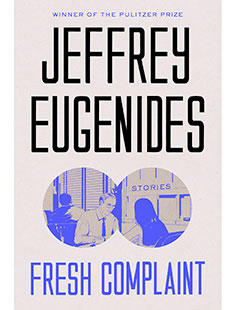
For professor of creative writing Jeffrey Eugenides, publishing his first collection of short stories has been “like finding your diary. It brings you back to the person you used to be.” For the reader, Fresh Complaint (Farrar, Straus and Giroux) is a dive into 30 years of Eugenides’ fiction, a sampler platter of one of America’s most lauded writers.
Known for his debut novel, The Virgin Suicides (later a film by Sofia Coppola), Eugenides won the Pulitzer Prize in 2003 for Middlesex, a groundbreaking exploration of gender identity that has become increasingly relevant. His 2011 novel, The Marriage Plot, a tale of postcollege life in the 1980s, won the Prix Fitzgerald and the Madame Figaro Literary Prize. The three novels have sold close to 4 million copies in the United States.
The new collection includes the first story Eugenides published, when he was a 20-something aspiring writer and sometime taxi driver who regularly received rejections from The New Yorker and The Paris Review. “Capricious Gardens,” written in 1986, is a fable-like tale of revenge, lust, and friendship set in an overgrown garden full of artichokes.
“I remember that as one of the most exciting moments in my writing life — the first time I saw my name in print and the first time it seemed like it could happen,” he says. After the opening chapter of The Virgin Suicides appeared in The Paris Review in 1990, Eugenides no longer had trouble getting editors’ attention. Several of the other stories in the book, most of which have appeared in The New Yorker, were written “when I was blocked with a novel and needed to finish something to tell myself I could do it, usually in some moments of despondency,” he says.
In “Early Music,” a father’s music career slips out of his grasp as the responsibilities of a wife and children weigh him down. The story took shape when Eugenides came across a journal article about people who devote themselves to playing medieval instruments and decided to have his protagonist play the clavichord, a precursor to the piano. “I deeply sympathize with people who love things that are vanishing,” he says. “As a writer you feel that. Literature sometimes seems like an antique procedure. Part of the job is to keep it from becoming obsolete.”
The title story — one of two stories in the collection that had never been published before — unpeels the layers of deception in the interaction between an American woman of Indian descent and a British cosmologist on a lecture tour. “I wanted to subvert the reader’s expectations and show the collateral damage that can arise from desperate acts, either of liberation or selfishness,” says Eugenides, who has taught at Princeton since 2007.
Despite his many successes, Eugenides finds that “the writing is always just as hard as it ever was. It never gets easier.”
He has been working on a new novel for a few years but is reluctant to talk about it. “What you’re working on has a tendency to sound like a bad idea when you say it, and then you doubt yourself,” he says. “The idea that you’re in possession of a secret story or knowledge is one you have to convince yourself of.”












1 Response
Norman Ravitch *62
8 Years AgoI am glad that Princeton has...
I am glad that Princeton has on its faculty some well-known novelists, like Joyce Carol Oates and Jeffrey Eugenides. But to be frank, I have found the books by them that I have tried to read totally unreadable. Oates has one novel about strange events in Princeton about 100 years ago; it contains some interesting negative views of Woodrow Wilson and lots of mystical nonsense, but its value escapes me. As for the gender confusions of Eugenides, I can only wonder if even at this late stage in our moral transformations it can really have any worth.
Sorry.